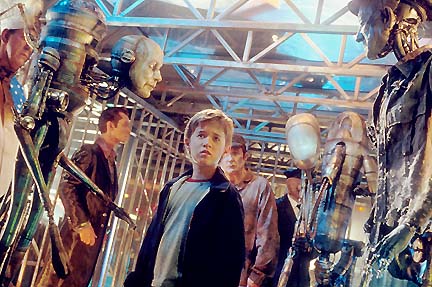


Steven Spielberg's "A.I." is a terrifically infuriating piece of work, all the more fascinating because the director has allowed us the luxury of being confused -- about the film, its message and indeed about the extra-cinematic world. This is a bit off-putting at first; as an adjective, "Spielbergian" has traditionally meant comfortable and comprehensible. And indeed, the milieu of "A.I." looks suspiciously like that of Spielberg films past: there's the isolated and misunderstood boy, the cuddly and toy store-ready sidekick, the two-letter title, that swelling John Williams score. E.T. phone home! Now!
By Scott Vogel
svogel@starbulletin.comBut almost from the moment the movie begins, in a bleak future after the polar icecaps have melted and humanity's depleted population is forced to utilize robots to keep society going, there's a chilly sense that Spielberg has left the happy suburban cul-de-sacs for good.
This sobering world of muted colors and sanitized countertops is definitely Kubrick-inspired, and indeed the project was originally developed by Stanley Kubrick, though abandoned before his death in 1999. It's a universe defined by tragedy, with married couple Monica and Henry Swinton (Frances O'Connor and Sam Robards) trying desperately to cope with the loss of their son Martin (Jake Thomas), a child kept alive cryogenically but whom doctors have little hope of reviving.
This makes them a good candidate for the latest in robot technology, a "mecha" (as in mechanized) boy by the name of David (Haley Joel Osment) who is offered as a replacement of sorts by a corporation known as Cybertronics of New Jersey. David is considered an advance on earlier models, most notably in his ability to feel love for his human parents. This is a boy who actually asks things like "would you like me to sleep now?" (He doesn't actually sleep, but "can lie quietly and not make a peep.") As such, David is meant to represent the guilty fantasy of parents everywhere, a being both cute and manageable, docile and predictable.
And for a time, that's what David is. But soon, the exceptional craftsmanship that created him has backfired; he's so lifelike he begins to feel inconvenient emotions like jealousy and a child's need for individual attention. Around this time, also inconveniently, the Swinton's real son is mysteriously brought back to life, a bullying sort who immediately sets about the task of discrediting his robot brother, encouraging David to engage in activities that leave the parents fearing for everyone's safety.
Finally convinced he's a menace but unwilling to take him back to Cybertronics (where, we are told, he will be destroyed if returned), Monica drives David to a remote location, ending up in a forest where she gives him some money and then walks away, quite as if he's a dog she couldn't be troubled to take to the pound. But David, realizing what's happening, begs her to reconsider, his terrifying screams certain to reawaken those long-buried fears of parental abandonment we all carry within us.
It's one of the rawest scenes of cruelty Spielberg has ever filmed, and it sets up a hallucinatory "Wizard of Oz"-like second act in which David goes in search of the Blue Fairy (of "Pinocchio" fame), hoping she might change him from a robot into a real boy -- in which case, he theorizes, his mother would love him again. David is ably assisted in this quest by Jude Law who, as a British robot named Gigolo Joe, is a cross between Dorothy's scarecrow and C3PO. The Emerald City is dubbed Rouge City but the concept's the same -- searching outwardly for what is ultimately within -- except of course that there's nothing inside David but wires.
Which is why Rouge City, and indeed the entire landscape of "A.I."'s second act, is a tawdry burlesque, ferrying us to places like a "Flesh Fair" (a sort of demolition derby in which early-model robots are destroyed to the delight of a cackling crowd of country jakes). It's all wonderfully creepy and wildly imaginative, the production design (by Rick Carter) among the best ever in a Spielberg film.
Even stranger are the film's final sequences, which take place "at the end of the world where the lions weep." It's also known as Manhattan, which, thanks to global warming, is mostly underwater. (Only the tops of its tallest buildings are visible.) As the movie passes the two-hour mark, it begins to drift somewhat, becoming less a story about a robot who wants to be real than a fairy tale about a movie that can't find an ending. Spielberg seems at a loss when confronted with the destiny of David and his longings for mother love, and the final sequence is as ambiguous as anything Hollywood has produced in some time.
Longtime fans might find Spielberg's desertion of rah-rah filmmaking traitorous, but "A.I." is nothing less than a highly provocative and exhilarating ride through the dark psyches of two of the greatest filmmakers of our time (and one not for young children -- parents be warned). It may never be his most beloved film, but Spielberg's earned the right to be unpopular, if anyone has.
PG-13 'A.I. Artificial Intelligence'
Consolidated Kahala, Kapolei, Koko Marina, Ko'olau, Mililani, Pearlridge & Ward; Signature Dole Cannery, Pearl Highlands & Windward, Wallace Keolu3 stars
Click for online
calendars and events.